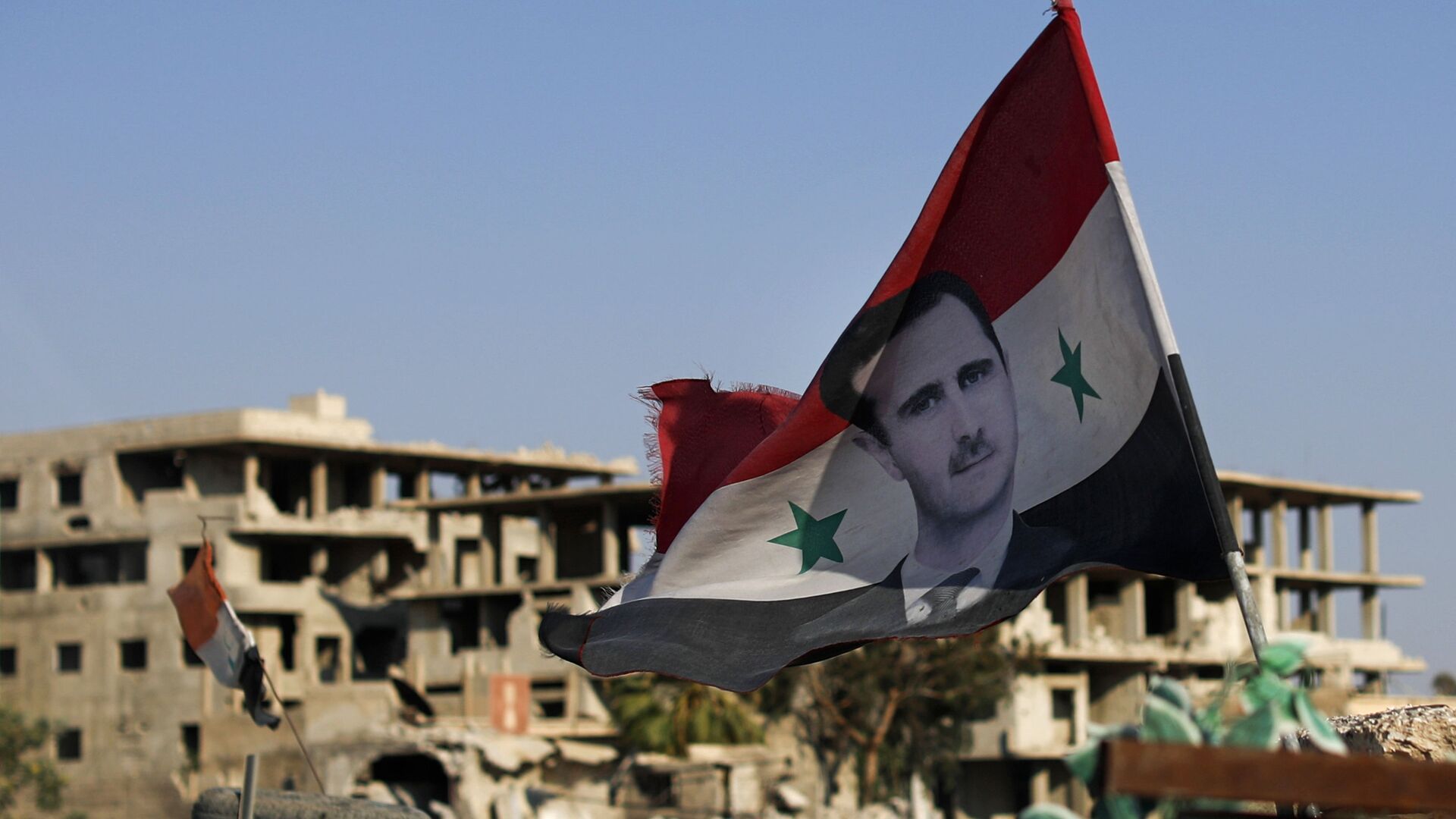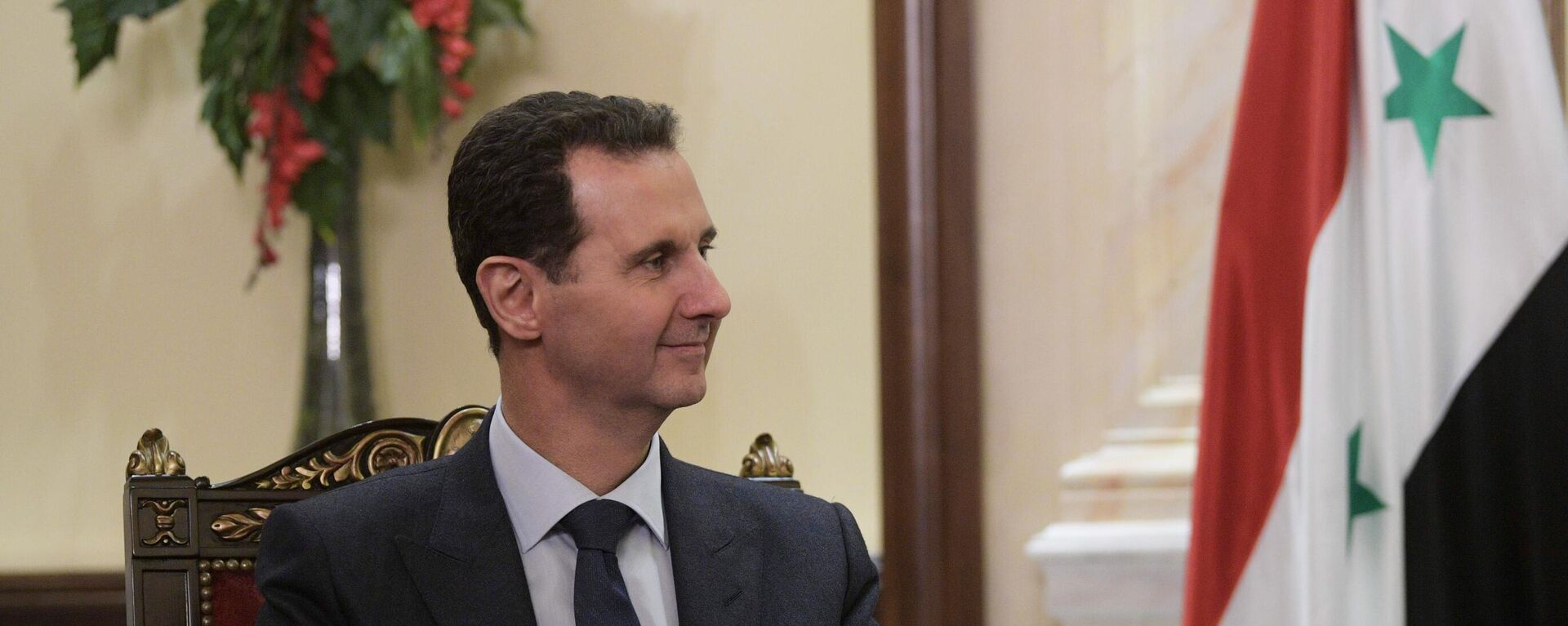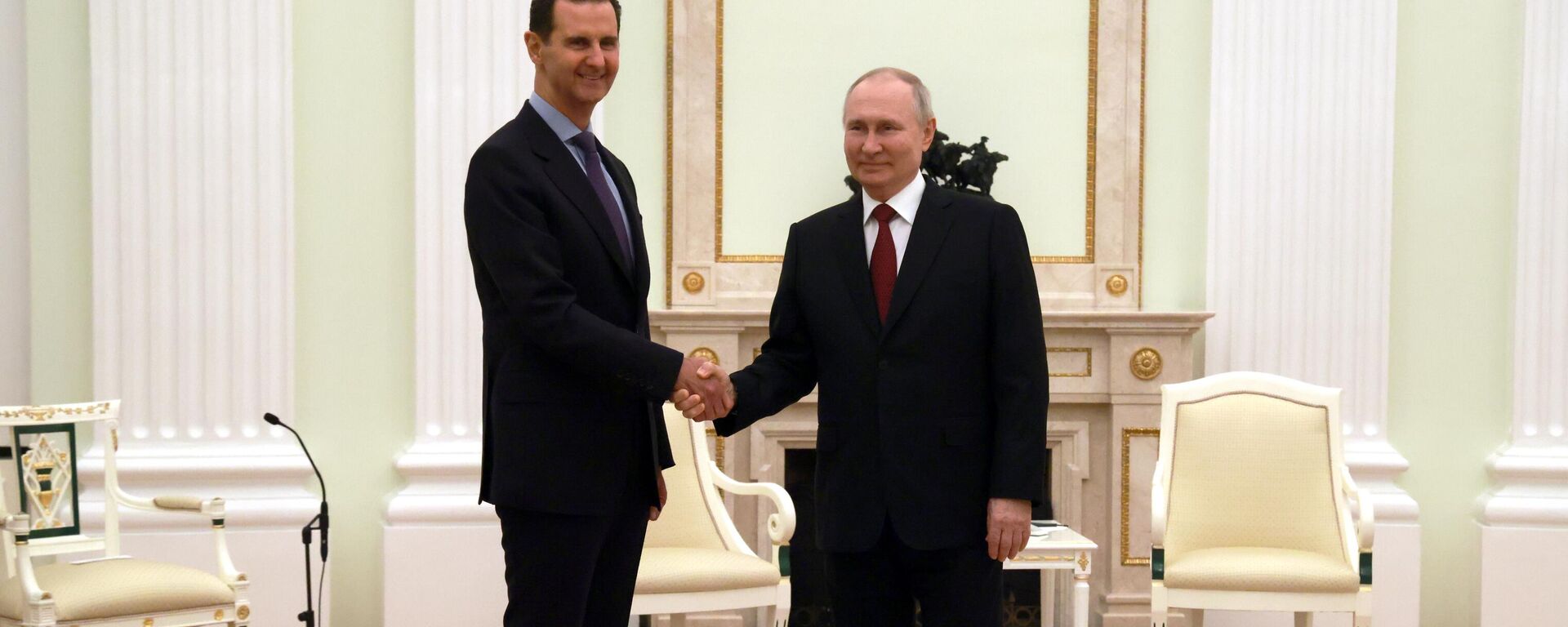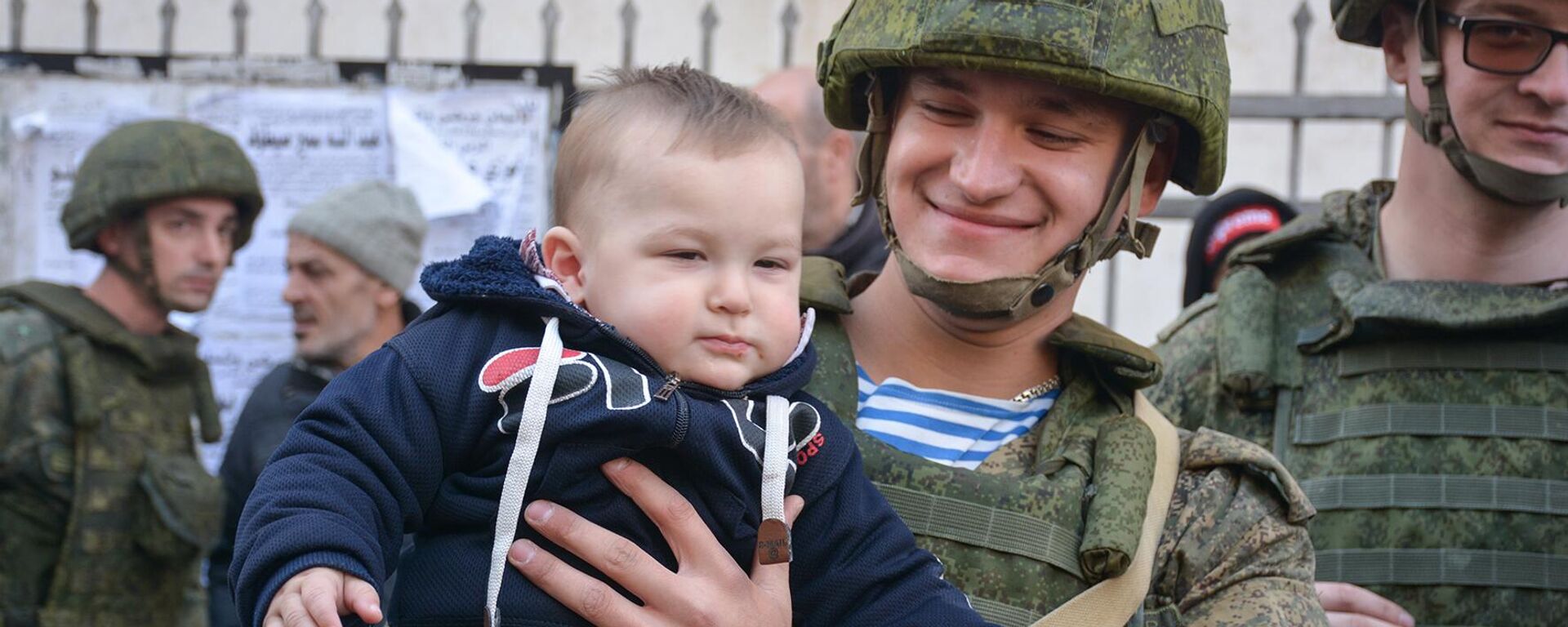https://sputnikglobe.com/20230315/twelfth-anniversary-of-war-how-syria-upended-wests-plans-to-nix-statehood-and-isolate-damascus-1108434106.html
Twelfth Anniversary of War: How Syria Upended West's Plans to Nix Statehood and Isolate Damascus
Twelfth Anniversary of War: How Syria Upended West's Plans to Nix Statehood and Isolate Damascus
Sputnik International
March 15 marks the 12th anniversary of the Syrian conflict which started with unrest that later translated into a multinational standoff fanned by the... 15.03.2023, Sputnik International
2023-03-15T18:35+0000
2023-03-15T18:35+0000
2023-03-15T18:34+0000
analysis
middle east
europe
us
saudi arabia
syria
bashar al-assad
vladimir putin
syrian war
syrian civil war
https://cdn1.img.sputnikglobe.com/img/07e5/02/05/1081984713_0:114:3054:1832_1920x0_80_0_0_2fe2b64bd7cf32f13087846115b67937.jpg
Russian President Vladimir Putin and his Syrian counterpart Bashar al-Assad held talks on Wednesday, March 15. Assad is still at Syria's helm despite the collective West's bid to replace him with a jihadi proxy during a bloody civil war which erupted exactly 12 years ago.Likewise, western governments have failed to isolate Damascus as talks are underway on Syria's return to the Cairo-based Arab League, a voluntary association of independent North African and Middle East countries. The backing of Saudi Arabia has reinvigorated the talks: Prince Faisal bin Farhan Al Saud made it clear last month at the Munich Security Conference that isolating Syria was not working."There is a new approach that has been adopted by many Arab countries, including Jordan, Iraq, Lebanon, Saudi Arabia, recently, before that Emirates, Bahrain and Oman. And also we have a new approach by Algeria, Tunisia, recently, most of the Arab countries are really adopting a new approach. Maybe there is a different motivation. Some want Syria to be closer to the Arab world rather than to be very close to Iran. Some want to balance their regional relations by including Syria in the formula of this regional relation. Some believe that Syria will witness an explosion because of the economic hardship in Syria itself that will revive instability in this country," Al-Rantawi continued.Syria's Suspension and Road Back to Arab LeagueSyria was suspended from the Arab League following clashes between government forces and armed opposition groups in 2011. In March 2012, the pan-Arab group decided to grant its seat to the National Coalition for Syrian Revolutionary and Opposition Forces, the opposition group that boasted backing of almost 100 states, including the US. Still, two years later, Arab League Secretary-General Nabil al-Arabi announced that Syria's seat in the group would remain vacant as the Syrian opposition forces had failed to establish the appropriate institutions.By September 2015, jihadi groups had moved very close to the Syrian capital Damascus, which was nearly two-three weeks away from falling to foreign-backed terrorist groups, as Syrian journalist Basma Qaddour recalled while talking to Sputnik in October 2020. Russia's decision to assist Syria at the request of the legitimate Syrian government in September 2015 came as a "huge turning point."As Damascus demonstrated resilience, showing that the Syrian Arab Republic wouldn't turn into another failed state akin to Libya, key Gulf States started demonstrating an interest in reinstating Syria's membership in the league from 2018. The official reopening of the Nasib border crossing between Jordan and Syria in October 2018 prompted hopes that it would revive the regional economy and reconnect Syria to the Arab world.What's more, on December 16, 2018, the Sudanese president, Omar al-Bashir, became the first Arab League leader to visit Syria following its expulsion. The visit was interpreted by western observers as a gesture of friendship on behalf of Saudi Arabia, which maintained close ties with Khartoum.The UAE reopened its embassy in Damascus in December 2018, while Bahrain announced that the kingdom had not broken off diplomatic ties with Syria despite the civil war. Several North African countries – Algeria, Morocco and Tunisia – also hailed Damascus' prospective return to the Arab fold. On December 31, 2018, Kuwait hinted that more Arab nations could reopen their embassies in the Syrian Arab Republic.Washington and its allies tried to throw a wrench in the process. In 2019, the Trump administration adopted the so-called Caesar Act, slapping sweeping sanctions on Damascus and threatening other world players against collaborating with the legitimate Syrian government.However, in February 2020, Algerian President Abdelmajid Tebboune resumed calls for Syria's readmission to the pan-Arab union. For his part, Jordan’s minister of industry and trade visited Damascus on March 5, 2020. In January 2021, Moscow and Riyadh agreed on the "importance of Syria returning to the Arab League as soon as possible". On May 3, 2021, a high-level Saudi delegation headed by the intelligence service chief Khalid al-Humaidan met with Syrian President Bashar al-Assad in Damascus.According to Sputnik's interlocutors, the latest push to reinstate Syria's membership in the Arab League was the devastating earthquakes, which dealt a heavy blow to the Arab Republic. Over 50,000 people were killed and millions more displaced after a series of earthquakes rocked southern Turkiye and northern Syria on February 6.Al-Rantawi particularly drew attention to the recent efforts by Faisal bin Farhan, the Saudi minister of foreign affairs, who made it clear last month that the current situation in Syria couldn't last."There is a need really to adopt a new approach," the scholar emphasized. "Saudi Arabia will host the next Arab summit, and most likely, I believe myself, Syria will be part of that summit. There is only one Arab country which is still against this opening up with the Assad [government], it's Qatar. We see Kuwait, Morocco reluctant and silent in general. But the rest of the Arab countries, I think, will be in favor of having Syria back to the Arab world."Why West's Attempts to Isolate Syria FailedThe West's efforts to isolate Syria failed since the traditional isolation does not work anymore, according to Dr. Ahmed Al Ibrahim, a Riyadh-based political analyst."We've seen how much the West isolated Iran for so many reasons," Al Ibrahim told Sputnik. "And look at them, where they are right now. Probably this is not the best way today to do this, because we understand that the only people who suffer from this isolation are the Syrian people (…) I think now it's the time to try something different because this traditional isolation does not work."At the same time, it is becoming clear that the US is losing its role in the region, according to Al-Rantawi. He referred to the fact that many US allies in the region are trying to pave the way for new independent policies and diversify their foreign ties. Many Arab countries still believe that America is a strong ally, but "not the only one on the scene," the Middle Eastern scholar emphasized.This breakthrough emphasized the setback of America's regional role in the region and the tendency for many Arab countries to diversify their international relations and to open up with other players in the world like Russia, like China, India, other countries, not to limit themselves to the United States, according to him."Countries in the region start thinking about their own national interest, not really limiting themselves to what the United States wants to impose on those countries because they have long experience with the United States. It proved that you cannot rely on this superpower to protect yourself and to better serve your people's interests," Al-Rantawi said.Russia Did Much to Stabilize SyriaThe Sputnik interlocutors agreed that Russia played a significant role in the Middle Eastern region over the past several years and obviously helped restore trust in Syria's future.Al Ibrahim also cited Russia's longstanding ties with the Syrian Arab Republic which originate from the Soviet era.Actually, many Arab countries rely on Russian channels to facilitate communication with the Assad government, noted Al-Rantawi, adding that Russia has good strong ties with many Arab countries, including the Gulf States."The Russian presence in Syria, I think, is an encouraging factor for many Arab countries, really, to resume contacts with Damascus," Al-Rantawi said. "This is very different from one country to another, based on differences between their interests.""For example, in Jordan it is believed that a deal with Russia as a neighboring country now on our northern border with Syria in the last 6-7 years, I think, there is a coordination with Russia, and many issues related to stability, security in the southern part of Syria, on the border, whether in combating extremism and terrorism or trying to calm down the situation in the three southern governorates that are connected and surveyed the neighboring Jordan or now the talks about the drugs challenge, there is a coordination between Jordan and Russia in this field," he continued.The Syrian Arab Republic has long been an integral part and an important member of the Arab world and Arabs feel that it is their duty to help the people of Syria to get them back on track and also to open the new economies for the GCC countries to rebuild Syria, rebuild Iraq, rebuild Lebanon, rebuild Yemen, and also rebuild Iran, according to Al Ibrahim.
https://sputnikglobe.com/20230315/president-putin-syrias-assad-hold-talks-in-moscow-1108407482.html
https://sputnikglobe.com/20230315/kremlin-syrias-assad-to-hold-in-person-talks-with-president-putin-1108418760.html
https://sputnikglobe.com/20230311/russian-military-says-2-planes-brought-quake-relief-aid-to-syria-1108300015.html
https://sputnikglobe.com/20230220/saudi-relief-center-on-syria-sanctions-humanitarian-matters-should-be-separate-from-rest-1107600743.html
https://sputnikglobe.com/20230130/erdogan-suggests-including-iran-in-planned-talks-with-russia-and-syria-1106805342.html
https://sputnikglobe.com/20230212/russias-relations-with-saudi-arabia-may-reach-level-of-strategic-partnership-envoy-says-1107350333.html
saudi arabia
syria
Sputnik International
feedback@sputniknews.com
+74956456601
MIA „Rossiya Segodnya“
2023
News
en_EN
Sputnik International
feedback@sputniknews.com
+74956456601
MIA „Rossiya Segodnya“
Sputnik International
feedback@sputniknews.com
+74956456601
MIA „Rossiya Segodnya“
syrian civil war, bashar al-assad's meeting with vladimir putin, syria and arab league, saudi arabia called for dialogue with syria, russia's stabilizing role in syria, gulf states reinstate ties with syria, arab countries provide assistance to syria, arab countries reopen embassies in syria, syria on track to return to the arab league
syrian civil war, bashar al-assad's meeting with vladimir putin, syria and arab league, saudi arabia called for dialogue with syria, russia's stabilizing role in syria, gulf states reinstate ties with syria, arab countries provide assistance to syria, arab countries reopen embassies in syria, syria on track to return to the arab league
Twelfth Anniversary of War: How Syria Upended West's Plans to Nix Statehood and Isolate Damascus
March 15 marks the 12th anniversary of the Syrian conflict which started with unrest that later translated into a multinational standoff fanned by the collective West. Russia's involvement turned the table on the war, disrupting the attempts to isolate Damascus.
Russian President Vladimir Putin and his Syrian counterpart Bashar al-Assad
held talks on Wednesday, March 15. Assad is still at Syria's helm despite the collective West's bid to replace him with a jihadi proxy during a bloody civil war which erupted exactly 12 years ago.
Likewise, western governments have failed to isolate Damascus as talks are underway on Syria's return to the Cairo-based Arab League, a voluntary association of independent North African and Middle East countries. The backing of Saudi Arabia has reinvigorated the talks: Prince Faisal bin Farhan Al Saud made it clear last month at the Munich Security Conference that isolating Syria was not working.
"I think it's not only Gulf States that have a new approach toward Syria, it's also Jordan and some other Arab countries. After 12 years of the crisis without any political horizon for a solution, there is a deeper understanding in the Middle East, in the Arab countries, including the Gulf, that the Syrian crisis should reach an end. Otherwise, it will spill over to many other neighboring countries," Oraib Al-Rantawi, founder and director general of the Amman-based Al Quds Center for Political Studies and an established writer and columnist, told Sputnik.
"There is a new approach that has been adopted by many Arab countries, including Jordan, Iraq, Lebanon, Saudi Arabia, recently, before that Emirates, Bahrain and Oman. And also we have a new approach by Algeria, Tunisia, recently, most of the Arab countries are really adopting a new approach. Maybe there is a different motivation. Some want Syria to be closer to the Arab world rather than to be very close to Iran. Some want to balance their regional relations by including Syria in the formula of this regional relation. Some believe that Syria will witness an explosion because of the economic hardship in Syria itself that will revive instability in this country," Al-Rantawi continued.
Syria's Suspension and Road Back to Arab League
Syria was suspended from the Arab League following clashes between government forces and armed opposition groups in 2011. In March 2012, the pan-Arab group decided to grant its seat to the National Coalition for Syrian Revolutionary and Opposition Forces, the opposition group that boasted backing of almost 100 states, including the US.
Still, two years later, Arab League Secretary-General Nabil al-Arabi announced that Syria's seat in the group would remain vacant as the Syrian opposition forces had failed to establish the appropriate institutions.
By September 2015, jihadi groups had moved very close to the Syrian capital Damascus, which was nearly two-three weeks away from falling to foreign-backed terrorist groups, as Syrian journalist
Basma Qaddour recalled while talking to Sputnik in October 2020. Russia's decision to assist Syria at the request of the legitimate Syrian government in September 2015 came as a "huge turning point."
As Damascus demonstrated resilience, showing that the Syrian Arab Republic wouldn't turn into another failed state akin to Libya,
key Gulf States started demonstrating an interest in reinstating Syria's membership in the league from 2018. The official reopening of the Nasib border crossing between Jordan and Syria in October 2018 prompted hopes that it would revive the regional economy and reconnect Syria to the Arab world.
What's more, on December 16, 2018, the Sudanese president, Omar al-Bashir, became the first Arab League leader to visit Syria following its expulsion. The visit was interpreted by western observers as a gesture of friendship on behalf of Saudi Arabia, which maintained close ties with Khartoum.
The UAE reopened its embassy in Damascus in December 2018, while Bahrain announced that the kingdom had not broken off diplomatic ties with Syria despite the civil war. Several North African countries – Algeria, Morocco and Tunisia – also hailed Damascus' prospective return to the Arab fold. On December 31, 2018, Kuwait hinted that more Arab nations could reopen their embassies in the Syrian Arab Republic.
Washington and its allies tried to throw a wrench in the process. In 2019, the Trump administration adopted the so-called Caesar Act, slapping sweeping sanctions on Damascus and threatening other world players against collaborating with the legitimate Syrian government.
However, in February 2020, Algerian President Abdelmajid Tebboune resumed calls for Syria's readmission to the pan-Arab union. For his part, Jordan’s minister of industry and trade visited Damascus on March 5, 2020. In January 2021, Moscow and Riyadh agreed on the "importance of Syria returning to the Arab League as soon as possible". On May 3, 2021, a high-level Saudi delegation headed by the intelligence service chief Khalid al-Humaidan met with Syrian President Bashar al-Assad in Damascus.
According to Sputnik's interlocutors, the latest push to reinstate Syria's membership in the Arab League was the devastating earthquakes, which dealt a heavy blow to the Arab Republic. Over 50,000 people were killed and millions more displaced after a series of earthquakes rocked southern Turkiye and northern Syria on February 6.
The earthquake and the humanitarian diplomacy paved the way for many Arab countries to open up with Damascus trying really to benefit from some facilities that the Americans offer for a third party country to deal with Syria but within the limitation of humanitarian aid. The United States, as you know, tried to differentiate between the need for humanitarian aid for the Syrian people and the veto against any political rapprochement with the Assad regime. Many Arab countries found it a good opportunity then to catch up with Damascus, benefiting from the pressure that the United States created from the consequences of the earthquake disaster.
Oraib Al-Rantawi
Founder and director general of the Amman-based Al Quds Center for Political Studies
Al-Rantawi particularly drew attention to the recent efforts by Faisal bin Farhan, the Saudi minister of foreign affairs, who made it clear last month that the current situation in Syria couldn't last.
"There is a need really to adopt a new approach," the scholar emphasized. "Saudi Arabia will host the next Arab summit, and most likely, I believe myself, Syria will be part of that summit. There is only one Arab country which is still against this opening up with the Assad [government], it's Qatar. We see Kuwait, Morocco reluctant and silent in general. But the rest of the Arab countries, I think, will be in favor of having Syria back to the Arab world."
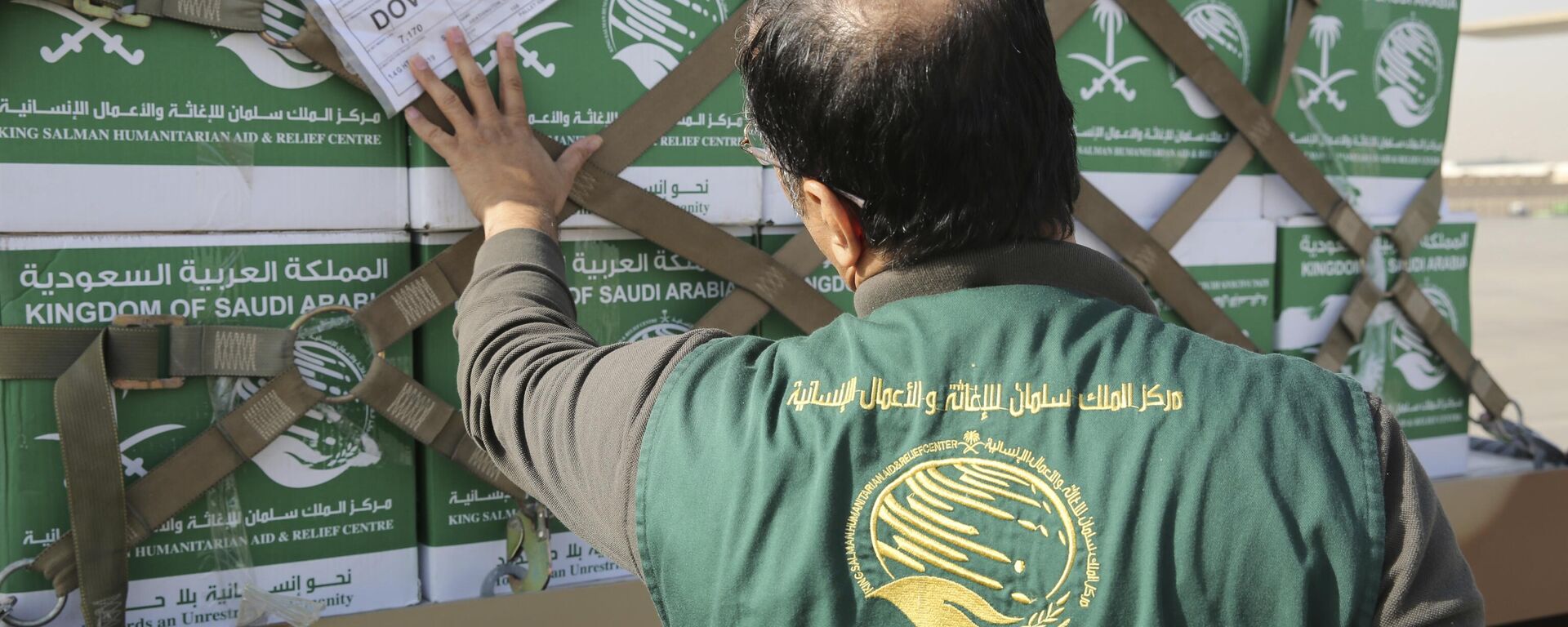
20 February 2023, 01:19 GMT
Why West's Attempts to Isolate Syria Failed
The West's efforts to isolate Syria failed since the traditional isolation does not work anymore, according to Dr. Ahmed Al Ibrahim, a Riyadh-based political analyst.
"We've seen how much the West isolated Iran for so many reasons," Al Ibrahim told Sputnik. "And look at them, where they are right now. Probably this is not the best way today to do this, because we understand that the only people who suffer from this isolation are the Syrian people (…) I think now it's the time to try something different because this traditional isolation does not work."
"We do understand how the West is also isolating Russia because of the Ukrainian conflict. And we see that Russia is basically having other markets. They have China, they have India, they have the Cooperation Council for the Arab States of the Gulf (GCC) countries. This isolation thing, it does not work anymore. It is sitting around a round table getting everybody to basically work with what needs to be done and not to disturb the people of these nations. Because the only thing that is going to happen is that the people of these nations are really having a bad taste in the countries that are stalling and isolating them," the Riyadh-based political analyst continued.
At the same time, it is becoming clear that the US is losing its role in the region, according to Al-Rantawi. He referred to the fact that many US allies in the region are trying to pave the way for new independent policies and diversify their foreign ties. Many Arab countries still believe that America is a strong ally, but "not the only one on the scene," the Middle Eastern scholar emphasized.
"We saw this in the last couple of years when Saudi Arabia insisted on respecting its commitment within OPEC+," Al-Rantawi continued. "This new opening between Arab countries and China, Arab summits with Xi Jinping in Jeddah, and now the recent major breakthrough game changer development, this tripartite declaration in Beijing, where the Saudis and the Iranians started really resuming talks and reaching agreement about exchanging the diplomatic representation and agreeing to try to solve the bilateral and regional issues diplomatically and by dialog around the table, not a through proxy wars as it used to happen in the last 10-12 years. This is a breakthrough."
This breakthrough emphasized the setback of America's regional role in the region and the tendency for many Arab countries to diversify their international relations and to open up with other players in the world like Russia, like China, India, other countries, not to limit themselves to the United States, according to him.
"Countries in the region start thinking about their own national interest, not really limiting themselves to what the United States wants to impose on those countries because they have long experience with the United States. It proved that you cannot rely on this superpower to protect yourself and to better serve your people's interests," Al-Rantawi said.
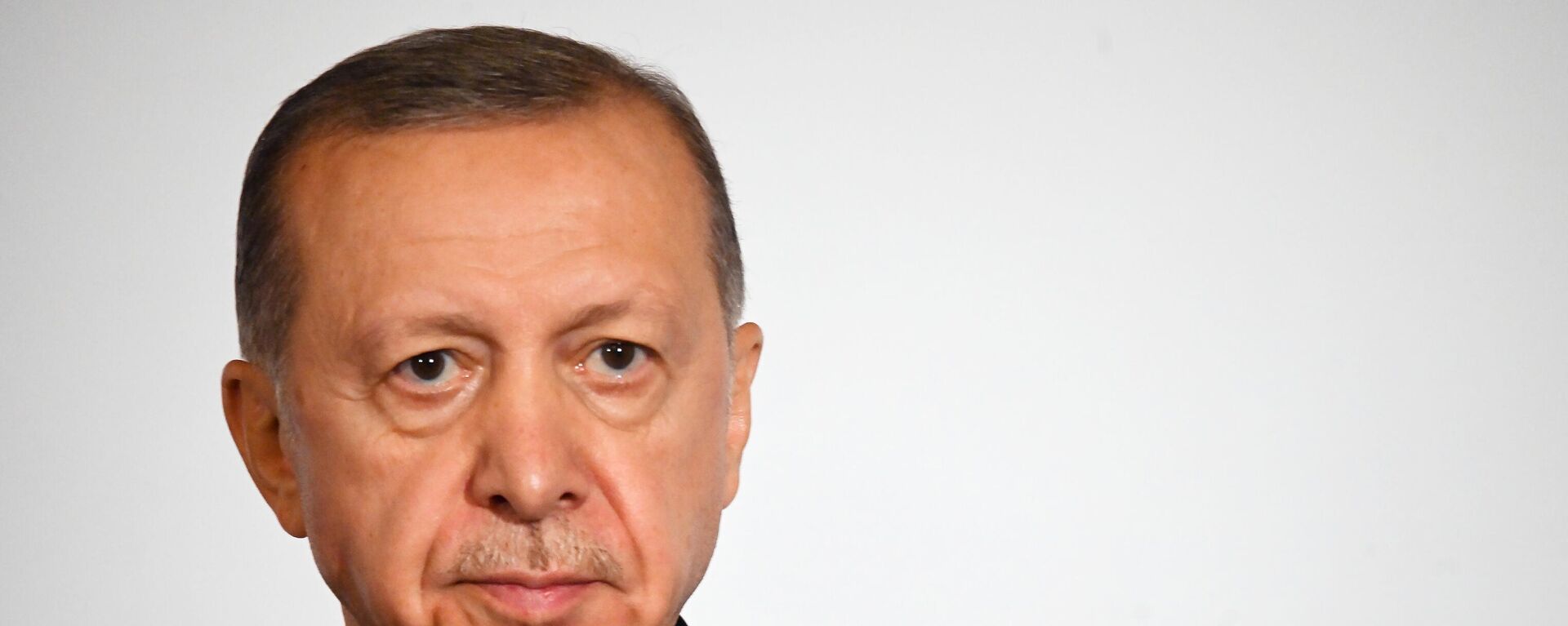
30 January 2023, 03:18 GMT
Russia Did Much to Stabilize Syria
The Sputnik interlocutors agreed that Russia played a significant role in the Middle Eastern region over the past several years and obviously helped restore trust in Syria's future.
"Russia has played a great deal in stabilizing Syria and basically giving a window of opening channels with other countries," said Al Ibrahim. "With the potential of initial normalization between Saudi Arabia and Iran, Syria is definitely one of the files on the table that is very important for the Arab states and everybody is committed to rebuilding Syria. We're going to hopefully see an advancement in the few coming days regarding Syria. All the GCC countries, the Arab countries, they're going to contribute to Syria to bring it back and to revive Syria and put more pulse into it."
Al Ibrahim also cited Russia's longstanding ties with the Syrian Arab Republic which originate from the Soviet era.
Actually, many Arab countries rely on Russian channels to facilitate communication with the Assad government, noted Al-Rantawi, adding that Russia has good strong ties with many Arab countries, including the Gulf States.
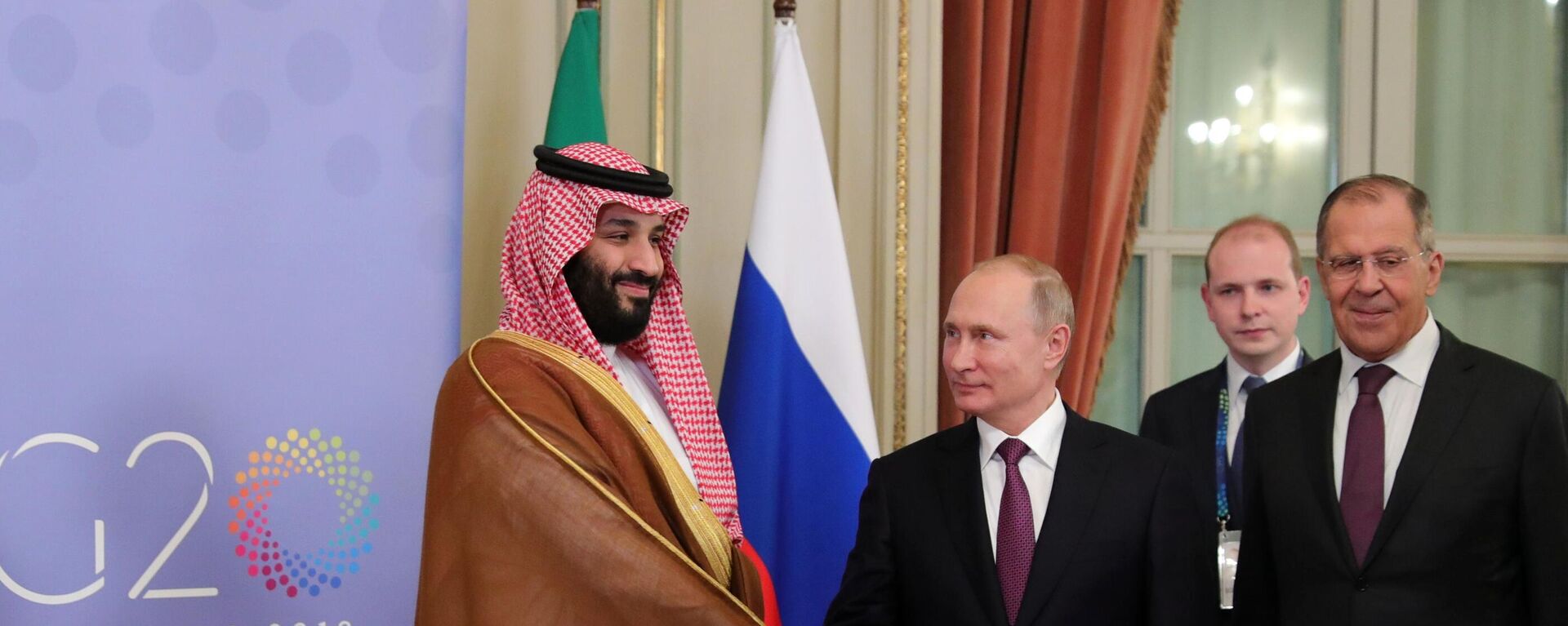
12 February 2023, 08:26 GMT
"The Russian presence in Syria, I think, is an encouraging factor for many Arab countries, really, to resume contacts with Damascus," Al-Rantawi said. "This is very different from one country to another, based on differences between their interests."
"For example, in Jordan it is believed that a deal with Russia as a neighboring country now on our northern border with Syria in the last 6-7 years, I think, there is a coordination with Russia, and many issues related to stability, security in the southern part of Syria, on the border, whether in combating extremism and terrorism or trying to calm down the situation in the three southern governorates that are connected and surveyed the neighboring Jordan or now the talks about the drugs challenge, there is a coordination between Jordan and Russia in this field," he continued.
The Syrian Arab Republic has long been an integral part and an important member of the Arab world and Arabs feel that it is their duty to help the people of Syria to get them back on track and also to open the new economies for the GCC countries to rebuild Syria, rebuild Iraq, rebuild Lebanon, rebuild Yemen, and also rebuild Iran, according to Al Ibrahim.
"Hopefully this is going to get more stabilization in the region, this region, especially led by Saudi Arabia, they want to zero all problems that are happening around them. We need to have a stabilized region. We need to talk to everybody. We need to work with everybody. Yes, they are not probably 100% on board, but there is always room to talk and there's always room to do things other than boycotting and isolating and doing all these kinds of things," Al Ibrahim concluded.
